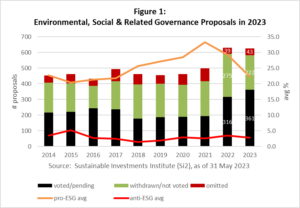Amit Batish is Senior Director of Content at Equilar, Inc. This post is by Mr. Batish and Courtney Yu. Related research from the Program on Corporate Governance includes Stealth Compensation via Retirement Benefits by Lucian Bebchuk and Jesse M. Fried.
The 2023 proxy season has officially come to a close. Over the last few months, public companies across the U.S. filed their proxy statements with the Securities and Exchange Commission (SEC), disclosing key elements of their policies related to corporate governance and executive compensation. The marquee topic of this proxy season was Pay Versus Performance (PvP), as it was the first year that companies were required to disclose tabular and narrative information reflecting the relationship between compensation actually paid (CAP) to a company’s named executive officers (NEOs) and the company’s financial performance.
Since the SEC’s announcement of the new PvP rules in August 2022, human resources, finance and legal teams have worked diligently to address the requirements and provide a crisp and clear proxy disclosure. To better understand and unveil how companies addressed first-year requirements, Equilar examined the proxy statements of the Equilar 500—the largest U.S. public companies by revenue. This post features a summary of findings from the analysis and a first-look at trends captured from PvP disclosures and calculations.
Due to the complex nature of the PvP disclosure, many internal teams began collaboration on calculations months in advance of proxy season. Among the topics discussed in those early meetings was the concept of the CAP calculation—one of the most critical components of the disclosure requirement. The goal of the CAP calculation is to capture the change in fair value of previously granted awards to named executive officers (NEOs), painting a clear picture of how much an executive has gained from equity awards over time. Separately, companies are also required to disclose their total shareholder return (TSR) and the TSR of their peer group.

The SEC Revolving Door and Comment Letters
More from: Michael Shen, Samuel Tan
Michael Shen is an Assistant Professor of Accounting at NUS Business School, National University of Singapore, and Samuel T. Tan is an Assistant Professor of Accounting at the School of Accountancy, Singapore Management University. This post is based on their recent paper, forthcoming in The Journal of Accounting and Public Policy.
The revolving door between the Securities and Exchange Commission (SEC) and the private sector has been the subject of a great deal of scrutiny in recent years. The SEC regulates, and enforces laws concerning, public companies, with a mission that includes “protecting investors, maintaining fair, orderly, and efficient markets, and facilitating capital formation“. However, SEC employees who leave the agency regularly find themselves aiding the very corporations the SEC is regulating, and working against the SEC’s regulatory activities. Between 2001 and 2010, over 400 former SEC employees filed statements that they intended to represent an external party before the SEC.
In our study, forthcoming at the Journal of Accountancy and Public Policy and available at SSRN, we examine the impact of the revolving door on the SEC’s comment letter process, a crucial process by which the SEC exercises its regulatory mission.
The Sarbanes-Oxley Act of 2002 requires the SEC to review companies’ filings at least once every three years, and the SEC sends comments to the company when SEC staff believe that the disclosures in its filings can or should be improved. This review process leads to a dialogue between the firm and SEC staff, in which the SEC may make requests of the firm, for example to amend one or more past filings, and in which the firm may negotiate for more desirable outcomes, for example to simply revise future filings. Firms often involve external lawyers in this conversation with the SEC, and these lawyers may have formerly been employed by the SEC.
READ MORE »